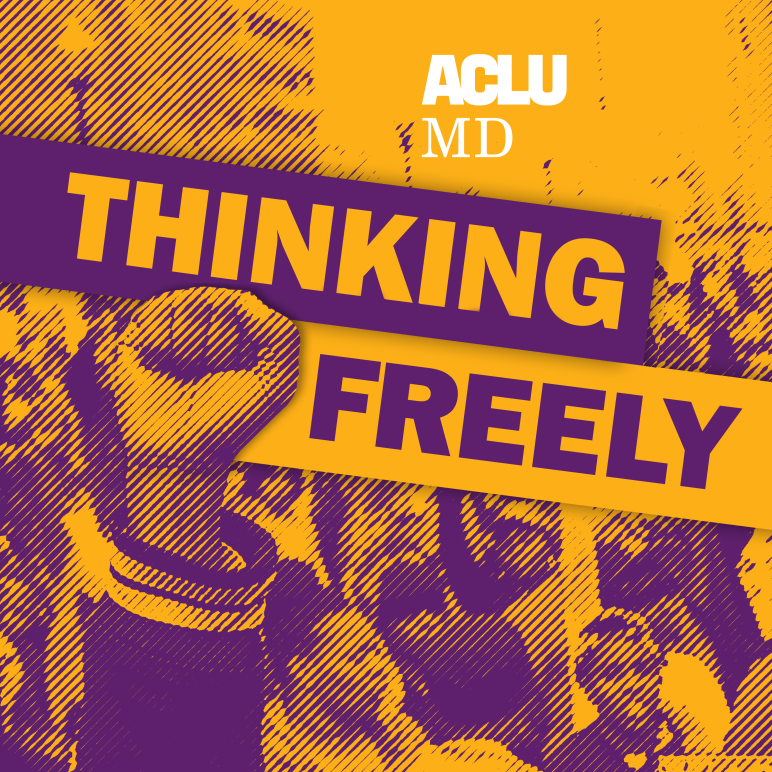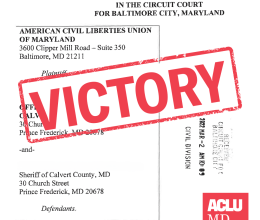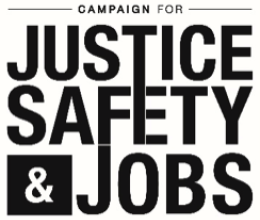BALTIMORE, MD – Featuring Tawanda Jones of the “West Wednesday Coalition” and Deborah Jeon of the ACLU of Maryland, discussing the impacts of silencing survivors of police abuse, the second episode of the ACLU’s new Thinking Freely podcast is now available.
Amber Taylor, producer and host of Thinking Freely said: “In every episode, we try to highlight issues and passionate activists from Maryland who are advancing social justice topics. We want to bring more awareness to these issues so that others can connect with what is going on in Maryland and hopefully make an even bigger impact on lives – for themselves and their community.”
On this episode of Thinking Freely, a podcast that focuses on pressing issues in Maryland, such as police abuse and ICE raids, Amber Taylor and the panelists speak about why “gag orders” from the government are First Amendment violations and how people like Tawanda Jones have been adversely affected by them.
Gag orders silence victims of police abuse as a condition of resolving their cases in court. Activist, leader of the “West Wednesday Coalition,” and someone who has personally been impacted by gag orders, Tawanda Jones said: “Condoning silence is condoning police violence.”
Since Tawanda’s brother, Tyrone West, was killed by a Baltimore City police officer in 2013, she has been out in the streets calling for justice – for more than 300 straight weeks. Baltimore City tried to force her to sign a gag order, but she refused. “We’re more than hashtags and body bags,” said Jones. “We’re more than being six feet in the dirt. We’re more than pictures on T-shirts. And we will not be gagged and silenced about police violence.”
Baltimore City officials require victims of police brutality to sign “gag orders” banning them from telling their own stories in order to resolve their cases, which is an extreme disregard for the First Amendment.
Deborah Jeon, Legal Director of the ACLU of Maryland, said: “What makes the First Amendment so important in my view is that it protects our rights as citizens to hold the government accountable by speaking out, protesting wrongdoing by police or government, and petitioning the government to remedy the wrongs that do occur.”
“Gag orders force survivors into seclusion and silence,” said Amber Taylor. “There can never even be a chance for healing from traumatic experiences of violence and abuse at the hands of police when survivors are gagged and bound as part of a case settlement. In a city where there is rampant police brutality, these ‘gag orders’ violate the First Amendment rights of Black and Brown people, particularly Black people.”
Our second episode, “Let Baltimore Speak: The Fight Against Gag Orders," features a powerful discussion about how “gag orders” silence survivors of police abuse, how the First Amendment can be re-imagined to better protect the free speech rights of Black and Brown people, and a recent victory in Ashley Overbey Underwood’s case where the United States Court of Appeals for the Fourth Circuit ruled that the City’s “gag orders” violate the First Amendment. We hope to hear more victorious news about ridding Baltimore of these shady “gag orders.” Listen here.
SUBSCRIBE: Thinking Freely is available Google Play, Apple Podcasts, Spotify, SoundCloud, Radio Public, Listen Notes, and Stitcher.
“The First Amendment was meant to serve as the backbone of our democracy, allowing people who are critical of the government the right to speak. Historically, white supremacists have co-opted the First Amendment to advance hate and incite violence. At the same time, we have seen the First Amendment rights of People of Color violated when they speak out against oppression and racism. The First Amendment is a vital tool that can be used to advance racial justice. That’s why survivors of police brutality and community members in Baltimore are fighting for the right to speak up against institutional racism within the police force. However, the Baltimore City government requires survivors to sign ‘gag orders’ that are meant to silence survivors of police abuse in order to resolve their cases.”
###






